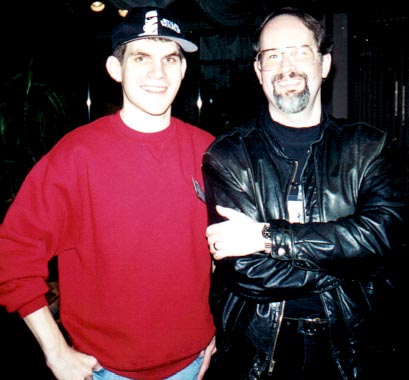

At StellarCon. held in High Point, North Carolina this past February, The Force.Net staffer Chris Knight had the opportunity to sit down and chat with Star Wars author Timothy Zahn. Covering everything from Zahn's graduate school days to Decipher's Mara Jade, Shannon Baksa, it was a great talk! Read on and enjoy!
TFN: Mr. Zahn, thank you for sitting down with us at TheForce.net. How do you like North
Carolina?
TZ: This is my second trip here. I was at StellarCon two years ago and really liked the
people. Haven't seen much of actual North Carolina: most of the time at conventions I see the
hotel and maybe a couple of restaurants outside if I'm lucky, before flying back home again.
TFN: Where is home for you?
TZ: Home is Oregon, the south coast.
TFN: You are originally from Illinois, right?
TZ: Right. Grew up in the Chicago area and then moved down to Champaign-Urbana for
grad school, and stayed for quite a few years.
TFN: Let's talk about grad school, because this is kind of how you wound up in science-
fiction. You were studying...?
TZ: Physics.
TFN: And you were working on your doctorate?
TZ: Right. I was working on a mathematical project that really wasn't going anywhere. It
was something we hoped would be useful in plasma physics. It wasn't really working. My
advisor was too stubborn to give up. And he was out of town a lot, so it gave me a fair amount
of time while I was stuck waiting for him to get back into town with not much to do, so I
started writing as kind of a hobby. I sold my first story in December 1978: it was a story
called "Ernie", it came out in the September '79 Analog. In July of that year, before the story
came out, my advisor died suddenly of a heart attack. No one else would pick up the project
because it wasn't working and probably would never work. So I spent a semester working on
the preliminaries for a new project, decided that I was having more fun writing, and decided in
January of 1980 to kind of "take the plunge", quit grad school and start writing full-time. So
this last month was my twentieth anniversary of being a full-time writer.
TFN: Congratulations!
TZ: Thank you.
TFN: You've got a family, right?
TZ: A wife and one son. Who's eighteen and six-foot two. And very smug about it.
TFN: I remember reading that your wife supported you both full-time while you were
pursuing this dream to be a full-time writer. It really sounds like this was a goal you set about
to fulfill wholeheartedly.
TZ: It was. We got married in August of '79, about two weeks after my advisor died and a
month before the publication date of my first story. We had some savings together and she had
a full-time job, so we decided that she would go ahead and do the main money support while I
would be here and see if I could make a living at this. I did much better than I expected that
first year. I had set a goal of a thousand dollars of income from stories and actually wound up
with about two thousand. It wasn't until about 1984 that I actually making enough money to
support us. So she was working pretty full-time making the living for us while I got this career
up and running.
TFN: In the years before you became involved with Star Wars, you built up quite a
bibliography: you had the Cobra novels, the Blackcollar novels. You also had a story called
"The Challenge" back in 1980. Tell us about that.
TZ: That was a computer-game story, that was on something like the Internet, with a
simulation: people could create computerized worlds. And other people then would come and
try to move through them, getting across a landscape to some goal while whatever animals and
creatures the "world creator" had invented would try to eat them or whatever. And with this
game going on we have a couple of alien probes on the Moon that have been studying Earth,
studying this fragmented race. It's not a hive-mind, it's a fragmented race is what they call
them. And wondering about the threat this might pose to us. So it's sort of a science-fiction
idea set with a games scenario alongside it. And no I did not invent the Internet or anything in
it! (laughs)
TFN: But still, when you go into a computer store or Wal-Mart and you see EverQuest, and
you see Ultima Online... there's very few science-fiction writers who see their creations become
prophetically fulfilled. Is that kind of...?
TZ: It seems so obvious that it would happen eventually. I don't consider it a real
prediction. I just saw the direction it was going and it seemed obvious. I'm not sure, I don't follow online
games. I don't know if there is anything quite like this where you can invent a world.
TFN: Oh yes!
TZ: There are?
TFN: Plenty.
TZ: Plenty? And other people come in and try to live in them?
TFN: Multi-user dungeons or some of the more commercial ones. It's really getting
commercial now.
TZ: I don't dare get involved in online games because then I won't do any work! And that's
what pays the bills.
TFN: So that was "The Challenge" in 1980. And after that you did the Cobra novels. There
were two?
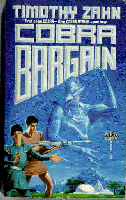
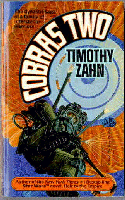
TZ: Three. "Cobra", "Cobra Strike" and "Cobra Bargain". They came out fairly close
together.
TFN: And you also did "Blackcollar".
TZ: Right, two books.
TFN: Those two series seem set in the same kind of milieu, about the military and soldiers.
TZ: The same military s.f. but they were in opposite directions: the Cobras were the high-tech
warriors with the implanted weaponry. The Blackcollars were the low-tech warriors, with the
martial-arts and the ninja-type weapons, because their enemy had easy ways of detecting large
amounts of metal or power sources, so it was a different style of warfare. The Cobra books
had a lot of political-sociological stuff as the Cobras are trying to create a colony with ordinary
citizens cut off from Earth. The Blackcollars were more a chessgame-"cat and mouse" type of
tactical storyline: the "us versus them" sort of thing. Trying to out-think and out-maneuver
rather than simply out-gun the enemy. So there's a different style for the two different series.
TFN: That's one recurring theme that comes up often in your books: strategy and tactics. It
really sounds like someone with a grasp of military strategy and appreciation for military
history. Have you ever had any kind of long-time interest in the military or strategy?
TZ: An interest in strategy. I've never served in the military. I was of the proper age during
the Vietnam War: I was in college and grad school and my number came up high in the draft
lottery, otherwise I would have gone. A lot of tactics to me is common-sense: thinking about
what I need to do and finding a way to do it. I've not extensively studied. I've read a fair
amount of military history and such, but nothing where I've gone and "okay, let me learn how
the tactics are done here." It's just sort of osmosis plus a kind of common-sense approach to it.
TFN: That sounds a lot like your character Grand Admiral Thrawn. You created Thrawn,
who is probably considered one of the greatest tacticians of all fiction. The character has built
up a lot of fandom over the years. Is Thrawn perhaps a little bit of Tim Zahn that's coming
out?
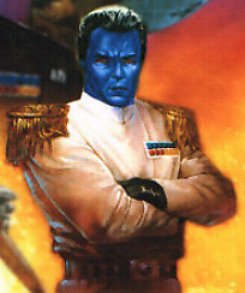
TZ: (laughs) Oh, Thrawn is a compilation of all the military geniuses throughout history. He's the kind of guy I'd like doing my strategy for me if I was in a war and such. Thrawn is fun. In many ways my Star Wars books were like playing both sides of a chessboard: I'd make the New Republic move, then I'd turn the chessboard around and make the Empire's move and such, then turn it back around. And I'm trying to win on both sides, so I'm having both sides try to out-think the other. Now, I know in each given battle or scenario who is going to actually win, because I know the requirements of the storyline. But I have to have both of them trying their best, and both being as brilliant and clever as they can, because that's where the fun of the writing is and that's where the fun of the reading is as well: of watching both sides be very clever. There's nothing more boring than a stupid hero or stupid villain who you could just run rings around because they're so stupid. It's not very realistic, and it's just not interesting for me.
TFN: With Star Wars being so established, with millions of people knowing this, that must
have been intensely trying to get it all right, envisioning this happening, playing it out and
keeping them in character. And you had a really neat trick to do that, too.
TZ: It was purely unintentional. Back when our son was very young, we discovered that if
we audiotaped a movie he had seen five or six times, like "The Wizard Of Oz", we could play
these tapes on long car trips, he could visualize what was happening in the movie, and he
would sit there for an hour and a half in the back seat, playing with his Legos and being nice
and quiet and happy as a clam. So we have probably a dozen of these movies on tape still
lying around the house, but we don't play them anymore. But the point of that was that where
I'd seen all the Star Wars movies "X" number of times, I'd heard them without seeing them "X
plus five or ten" times. Which meant that without the distraction of the visuals, I listened to
Han and Leia and Luke talk, and I think that kind of ingrained itself in my mind such that
when I started writing the Star Wars books, I had a very good feel as to how they sounded,
how they phrased things, and I could put that into the dialogue. But it was one of those
unintentional things. I had no idea the Star Wars books would ever be done, let alone that I
would be offered them, when we started doing this. It was purely a matter of keeping peace on
long trips.
TFN: That really worked out because when you got offered this in 1990, you already had all
these nuances in mind. Can you tell us how you did get approached to do Star Wars?
TZ: It was one of those "bolt from the blue" type of things. Back in '88, Lou Aronica
approached Lucasfilm to suggest that Bantam do a three-book continuation of the Star Wars
saga, picking up after "Return Of The Jedi", where no writers had been allowed to work
before, in novels or comic books or anything else. It took Lucasfilm a year to decide to go
ahead with it, and in late '89 they got back in touch with Aronica and said, "okay, let's give this
a shot. Find us an author and we'll talk contract." Bantam's editors got together and made up
a short list of writers they thought could do a good job on Star Wars books, sent the list out to
Lucasfilm with samples of our writing so they could see what kind of style each person had,
and the Lucasfilm people decided my style fit Star Wars best of the ones they were offered. So
I got a Monday afternoon 4 p.m. call from my agent saying "we've had a very interesting offer
here." I had no idea it was in the works. I had been with Bantam a grand total of six weeks at
that time. My editor had almost not recommended me at their editors meeting because she
wanted to see the book I'd contracted for and didn't want me sidetracked with this media
stuff. So it was one of those things where all the pieces just laid out in the proper position,
proper order, and I got the offer. It then took Lucasfilm and Bantam five months to work out
their contract. I had the outline in the first month for all three books, but then I couldn't
start writing for a few months but I had all of it simmering in my mind while I worked on other
projects. So it was really quite ready to go by the time I actually started writing.
TFN: "Heir To The Empire" came out in 1991, shot through the roof and made #1 on the New York Times Bestseller list. The first real Star Wars story in, at the time, eight years. Did Lucasfilm give you any guidance or areas that you could not veer off into?
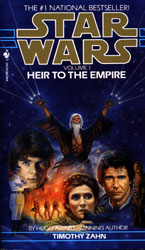
TZ: What they did mostly was, rather than tell me things I had to do or setting up walls at the
beginning, they let me do whatever I wanted to and then told me what I couldn't. Sort of like
an "I would run until I ran into a wall" type of thing. The two guidelines I was given at the
beginning were: I was to start three to five years after ROTJ, and I could use any character
who had not been killed off in the movies. It was very, very open. When I submitted the
outline, we found a few other walls: I could not do detailed references to the Clone Wars era. I
had a sort of history of the Clone Wars set up because at that time I didn't know he (George
Lucas) was going to go back and do more movies, so I thought that was opened at length as
well, but it turned out it wasn't. Various other things: Joruus C'baoth was originally an insane
clone of Obi-Wan Kenobi and they wouldn't let me do that. And I would run into minor walls
here and there, both in the outline and in the final manuscript. But it was more a matter of,
instead of getting what I had to do, they would let me do what I wanted unless it ran into some
territory they didn't want me dealing with, or contradicted something that they saw in the
movies, though I could sometimes argue my way out of those. So it was very much open. I
got to do virtually everything that was important, what they wouldn't let me do was really quite
minor and easily changed without damaging the book itself. So it was really a good
experience. And similiar with the Hand of Thrawn duology. Then I had to make connections
with the other books that had come out since the Thrawn trilogy. That made it a little trickier,
but not significantly so. And again, Lucasfilm was very good about letting me do pretty much
what I wanted to, though I did have to argue a few points here and there and make some
compromises.
TFN: Can you see where the prequels, or the story that we think is forming now with the
prequels, might have influenced Lucasfilm in their policies towards what you could and could
not do?
TZ: A lot of the problem with what I couldn't do was that the marketing people didn't know
what Lucas had planned. He was keeping this under wraps, and they were tending to err on
the side of caution, which I certainly understand: that they were worried that I might run into
something Lucas was doing. And therefore, since they didn't know exactly what he was doing,
better not to let me do this than take the risk. So, I don't think there was anything in "The
Phantom Menace" that violated anything that I did. The only real problem we had that is a
glaring error in my books is that they would not give me a Clone Wars date until I was mostly
done with book two ("Dark Force Rising"). The first book was already at the printers and they
actually moved it back about fifteen years earlier than I had set it. As a result, the various
numbers don't add up. When it talks about Pellaeon's age, they don't add up because there's
this fifteen-year difference. They might have actually set it back a bit further when they set on
"The Phantom Menace". So the timeline doesn't quite match, but nothing else I think finally
contradicts what I've done. It would have been nice to know that the head of the Senate was
called the "chancellor", and some of these little details would have been nice to know, but that's
not a big problem.
TFN: With the "Hand of Thrawn" duology, the situation seems reversed 180 degrees. Because now instead of Lucasfilm saying there were some things you can not touch, there almost seems like there's some "damage control" going on here. When you see Mara Jade saying that she doesn't believe the Emperor was resurrected, and that kind of segues into what's going on now with Star Wars literature. Were there any kind of instructions you were under, like, "go in and fix this"?
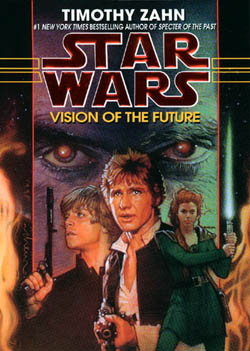
TZ: (laughing) No no, not at all. It was my perception of some of the things that I didn't care
for. All the stuff passed Lucasfilm, and it was all authorized. But other authors' visions of
what Star Wars is and what it should be are not necessarily what I would do. And one reason I
agreed to do the "Hand of Thrawn" was to kind of get the last word, so to speak. Now... the
New Jedi Order is taking off with my character Mara Jade. But I wanted a "last word", one
more bit of input into certainly my characters and my vision of Star Wars. But there were
some things there that I thought were out of character, were not the way I saw Star Wars. And
I wanted to kind of talk about them, make some kind of rationale about them, bring things
back to what I thought, and if Lucasfilm agreed, it would come out in the books. If it didn't,
we would have some problems of reconciliation. One of the dangers you always have with a
"superman"-type character is making them too powerful. And I think that was the direction
Luke was being taken: he was getting more and more powerful. The danger of that is, the
books get boring: "why can't he just wave his hand and fix the problem on page four?" I
wanted to bring him back down to a level that you saw Yoda and Ben doing in the movies,
where there's certainly a power there, but it's not as flamboyant as, say, some of the things in
some of the books. So I did what I thought was useful and necessary and made sense, and
Lucasfilm apparently agreed. Or at least decided it was no better or worse than anyone else's
ideas.
TFN: So you decided to remove Star Wars from becoming strictly more science-fiction-ish
and back to the mythic archetype?
TZ: Well no, it's not a matter of science-fiction. I try to put science-fiction elements, not just
the science-fantasy. But it was a matter of balance. In my opinion, things had gotten out of
balance in some directions and I wanted to take a shot at putting them back. Again, it's my
opinion, and other people will disagree with what I did, and they do, or will agree, and we all
have differing views of Star Wars.
TFN: Are you surprised at the popularity of Mara Jade?
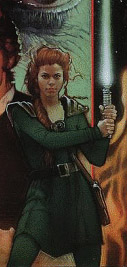
TZ: I'm always surprised when people like my books. By the time I'm finished it I'm sick of
the book and I don't know anyone who'd ever want to read this thing or not. I did not set out to
make Mara Jade a very popular character: I made a character I wanted to write about and was
interesting, and I thought would work well with the movie characters. And I am gratified that
she took off in popularity.
TFN: Which one is she in "Jedi"?
TZ: She's not in the movie. I had hopes that in the Special Edition they might put her in there,
but not. On the other hand, I can argue very easily that given her mission and her identity,
she'd be in the background. She wouldn't be anywhere near where the camera's pointing
anyway. So she's just off-camera someplace... staying to the shadows, looking at Luke.
TFN: And what about Thrawn? Given the chance, would you like to see Thrawn somewhere
in Episode 2 or 3?
TZ: Oh, definitely! I would be delighted to see a blue-skinned alien just walk in the
background behind other people talking. I'm not expecting it, but it would be very nice.
TFN: Did you expect Luke and Mara to get married?
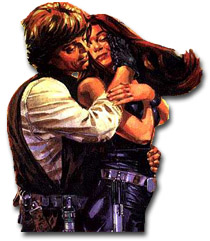
TZ: Yes. I always intended that they would be getting together at some point. She seemed to
be, from my point of view, the perfect match for him. The problem I saw was that as I was
finishing up "The Last Command", they had already contracted twelve more books: they'd
realized the series was taking off. Other authors were going to be doing them, I wasn't, so I
figured whatever they decide is out of my hands now: it's licensed material, I"ve had my fun. I
had to say goodbye to Mara, whatever happened to her was out of my hands. Then when they
came back at the end of '93 and asked me to do one more book to sort of "bookend" the
Bantam series, I thought about it for awhile and came up with two things I needed to do if I
was to the book: one was to end the war between the New Republic and the Empire, and [two] to get
Luke and Mara together. If we're going to do some kind of closure to the Bantam series, those
two events needed to be done. At first they were unwilling to have Luke and Mara married,
engaged, whatever. They wanted it left ambiguous. I said those were the two things I feel are
needed for closure: if it wasn't agreeable someone else could do the book, that's fine, and it was
one book originally. And they came back and agreed to let me do that. So it was immensely
fun during the next few years to watch all the rumors starting that Luke was cursed, he could
never get married because Lucasfilm had decided Luke would never be married, all the time
knowing that, yes he WAS set up, and all the authors knew he was set up, and so they were
bringing it that direction. So any woman they brought in would eventually be written out or
put into "friendship mode" or whatever. So it wasn't a matter of Lucasfilm was saying "no", it
was a matter that the other authors were aiming the same direction I was. And everyone was
keeping it a secret. It was very well done.
TFN: What do you think of the new actress for Mara Jade on the Star Wars card?
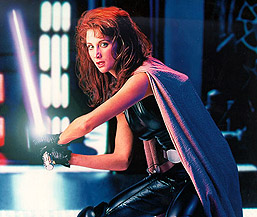
TZ: I'll be meeting her next month, at the Texas Sci-Fi expo. I envision a lot of pictures with
the two of us: a "Mara Jade and her creator" kind of thing. My first look is not probably quite
who I would have chosen. On the other hand, a lot of my vision of Mara is her attitude, her
bearing. If this woman can do that, then it will be just fine. That's one of the reasons I want to
meet her, to see if she can do a Mara. Aside from the red-gold hair and the green eyes, I didn't
have an awful lot of visual. I don't visualize characters physically so much as I do their minds
and their attitudes and how they speak and how they do things, the more internal stuff. So I
didn't go into this with an image of Mara. I've been looking since then for someone when they
were going to put her on the cover. They tend not to ask the authors for art advice. Most
editors and publishers learn through the years that it's not a good idea, because authors are
never satisfied, then the authors are mad.
TFN: Will you do any more with Star Wars?
TZ: As far as I know I'm done with Star Wars. I'm not contracted to do any of the books in
the New Jedi Order. There's no market for short-fiction at the moment, which I am sad about
because I enjoy doing the short stories. Comic books, I think Dark Horse is cutting back a
little on their Star Wars to leave more room for more of their original things. On the other
hand after I was finished on "The Last Command" I was done with Star Wars too, so who
knows? I've learned never to say never. At the moment I'm done with Star Wars. I did a
calculation a while back and I've written eight-hundred thousand words in the Star Wars
universe, so I figure, I've had my say. If I don't do anymore, I've had my run in the Star Wars
universe. I can pass the torch to other people without regret.
TFN: You've certainly left your mark: you've created Thrawn, you've created Mara Jade.
One thing about that: how do you pronounce Thrawn's real name?
TZ: Mi-thraw-noo-ro-o-do (pronounces it three times)
TFN: (trying to pronounce) That is such a tongue-twister.
TZ: Well it's supposed to be an alien name. This is why they decide to use his core name
instead.
TFN: How do you pronounce Joruus' name?
TZ: "Jo-roo-us Sa-bay-oth".
TFN: And "ysalamiri"?
TZ: "Ee-sal-a-meer", singular, "ee-sal-a-mee-ree", plural. "Jo-roo-us" is the clone with the
extra "U", "Jo-roo-us Sa-bay-oth". Talon Karrde (like "card"), "Mi-thraw-noo-ro-oo-do".
Let's see, what other ones are we missing? "L-oo-ook" (Luuke, the clone of Luke from "The
Last Command"). One of the interesting things about Star Wars is running into problems with
Earth words. I ran into some grief over the hot chocolate thing, because that's an Earth term.
And my response is "Millennium FALCON, light-SABER", I mean you're stuck with Earth
words, if you're going to write in English, and that's all that you can do about it. "Katana"
went through with no problem. However in the original, the Noghri central hut was called a
"keeva", and my editor said that was an American Indian term. Okay, well "katana" is
Japanese, "falcon" is a bird, but "keeva" won't work? Well she made me change "keeva", but
not the others. So it was a strange experience which words and which things would get their
red flags and which ones wouldn't. It's just one of the fun things of working in a galaxy that's
not supposed to be ours.
TFN: Star Wars is always thought of as having a multi-cultural tapestry. Why would they do
that?
TZ: You never know what will yank somebody out of the story. "Duck" would yank me out
of the story, "hot chocolate" didn't bother me obviously, but it bothered some people. I'm sure
"katana" bothered some people. I got a letter from someone who said "corvette" was a car. I
had to explain that before it was a car it was a military warship. With things like that, you
don't know what's going to yank somebody out of the story and ruin their suspension of disbelief.
And there's nothing you can do about it because it's not the same for everybody. You
just have to do the best you can and hope for the best.
TFN: About the midi-chlorians and ysalamiri: do they have "anti-midi-chlorians" or what?
TZ: I do not like the midi-chlorian idea at all. I hope that it will maybe be dropped. It sounds
like an attempt to make a scientific basis for something that really was more mystical to begin
with. I'm not sure of the purpose of it. Maybe it'll show up later on as being important. But
the idea that you can scan for a Jedi with a blood test bothers me for some reason. I've always
thought of the Force as more like a talented art, that is something that "if you've got it, you
know it and you can develop it," but it's not something that you can look at a person and say
"okay, he's got that talent," just cold. Again, I would hope that everything done in "The
Phantom Menace" has a reason further on down the line. So I don't particularly care for the
idea but I'm going to withhold final judgement until I see what he does with it. He may have
something brilliant in mind that I'm going to look back and say "okay, THAT'S why he did
that, it makes sense, I'm happy." You can't tell mid-way through.
TFN: Which characters did you most enjoy working with, both from the movies and your own
characters?
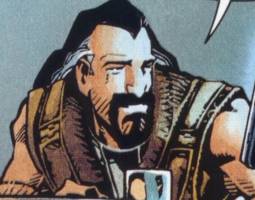
TZ: Certainly the three of my own I like best are Karrde, Mara and Thrawn. They were the
most fun to write. Karrde was a neat character to play with: Karrde I always thought, or I set
him up to be, where Han Solo would have been if he hadn't met Luke in that cantina. He
claims to be out for himself, but he really does have a moral core whether he'll admit it or
not. As far as the movie characters are concerned, I like the three: Luke, Han and Leia. I don't
know who I like best but my editor, after turning in "Heir To The Empire", her take was that I
like Han best because I gave him all the best lines, and that may be true. I do like lightsabers
and the idea with working with the Force intriguing and fun as well. A lot of the fun was being
able to take the established characters, put my characters into their universe and having them
interact as seamless as possible. It's not like "Forrest Gump" where you're printing this image
of this guy onto existing film. I'm trying to write them actually into the universe and make it
something like they were always there.
TFN: You've been at work on some other stuff. You've got "The Icarus Hunt" out now. It's
doing well, you're obviously very proud of that.

TZ: It was a fun book to do. My one-sentence description was "Star Wars meets Alastair
McLean".
TFN: Who was Alastair McLean?
TZ: He was a writer in the Sixties and Seventies. I think he wrote some into the Eighties.
He's the one who wrote "The Guns of Navarone", "Where Eagles Dare", "Ice Station Zebra".
The movies tended not to be very good from his books, but his books themselves were
wonderful. They were a combination of thriller and mystery. They were a lot of fun to read,
and I just ate them up. Wonderful plot twists, lot of good tension. He was one of the four
authors I set out as kind of the target when I first started writing. This was what I wanted to
learn: plotting, plot twists, and tension from him and his writing.
TFN: Anything about Timothy Zahn you'd like to share with our readers?
TZ: I'm just an ordinary person. I didn't have a bad childhood, I'm not writing because I wake
up at two in the morning and can't sleep because the muse is burning or I have demons to
exorcise from my soul... it's a fun way to earn a living. And I'm having a great deal of fun!
TFN: Thank you for taking the time to talk with TheForce.net, Mr. Zahn, and we wish you all
the best with your work in the future.
TZ: Thank you.